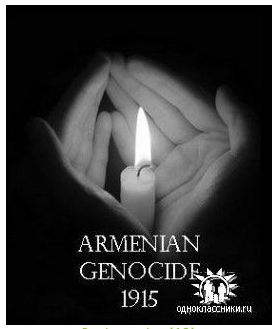by Will Pearson
 |
| Armenian victims of genocide, 1915 |
In January 1915, Turkish
General Enver Paşa attempted to push back the Russians at the battle of
Sarıkamış, only to suffer the worst Ottoman defeat of the war. Although poor
generalship and harsh conditions were the main reasons for the loss, the Young
Turk government tried to shift the blame to Armenian treachery. Armenian
soldiers and other non-Muslims in the army were demobilized and transferred
into labour battalions. The disarmed Armenian soldiers were then systematically
murdered by Ottoman troops, the first victims of what would become genocide.
About the same time, irregular forces began to carry out mass killings in
Armenian villages near the Russian border.
Armenian
resistance, when it occurred, provided the authorities with a pretext for
employing harsher measures. In April 1915 Armenians in Van barricaded
themselves in the city’s Armenian neighborhood and fought back against Ottoman
troops, On April 24, 1915, citing Van and several other episodes of Armenian
resistance, Talat Paşa ordered the arrest of approximately 250 Armenian
intellectuals and politicians in Istanbul, including several deputies to the
Ottoman Parliament. Most of the men who were arrested were killed in the months
that followed.
Soon
after the defeat at Sarıkamış, the Ottoman government began to deport Armenians
from Eastern Anatolia on the grounds that their presence near the front lines
posed a threat to national security. In May the Ottoman Parliament passed
legislation formally authorizing the deportation. Throughout summer and autumn
of 1915, Armenian civilians were removed from their homes and marched through
the valleys and mountains of Eastern Anatolia toward desert concentration
camps. The deportation, which was overseen by civil and military officials, was
accompanied by a campaign of mass murder carried out by irregular forces. Survivors
who reached the deserts of Syria languished in concentration camps,
many starved to death, and massacres continued into 1916. Conservative
estimates have calculated that some 600,000 to more than 1,000,000 Armenians were
slaughtered or died on the marches. The events of 1915–16 were witnessed by a
number of foreign journalists, missionaries, diplomats, and military officers
who sent reports home about death marches and killing fields.
The
Armenian Genocide laid the ground for the more-homogeneous
nation-state that eventually became the Republic of Turkey. By the end of
the war, more than 90 percent of the Armenians in the Ottoman Empire were gone,
and many traces of their former presence had been erased. The deserted homes
and property of the Armenians in Eastern Anatolia were given to Muslim
refugees, and surviving women and children were often forced to give up their
Armenian identities and convert to Islam. Tens of thousands of orphans,
however, came under the protection of foreign missionaries.
The Armenian
Genocide had both short- and long-term causes. Although the expulsion and
murder of hundreds of thousands of Armenians in 1915–16 was an immediate
response to the crisis of World War I and not the result of a long-held plan to
eliminate the Armenian people, its deeper causes go back to Muslims’ resentment
of Armenians’ economic and political successes—a reversal
of traditional Ottoman social hierarchies
that had Muslims superior to non-Muslims—and to a growing sense on the part of
Young Turk leaders and ordinary Muslims that Armenians were an alien and
dangerous element within their society.
Turkey has
refused to recognize that the events of 1915–16 constitute a genocide, even
though most historians have concluded that the deportations and massacres do
fit the definition - the intentional killing of an ethnic or religious group.
While the Turkish government and allied scholars have admitted that
deportations took place, they maintain that the Armenians were a rebellious
element that had to be pacified during a national security crisis. They
acknowledge that some killing took place, but they contend that it was not
initiated or directed by the government. Major countries—including the United
States, Israel,
and Great Britain—have also declined to call the events genocide, in order to
avoid harming their relations with Turkey. In 2015 government officials in
Turkey offered condolences to the Armenian victims, but Armenians remained
committed to having the killings during World War I recognized as genocide.

Comments
Post a Comment
Comments with names are more likely to be published.